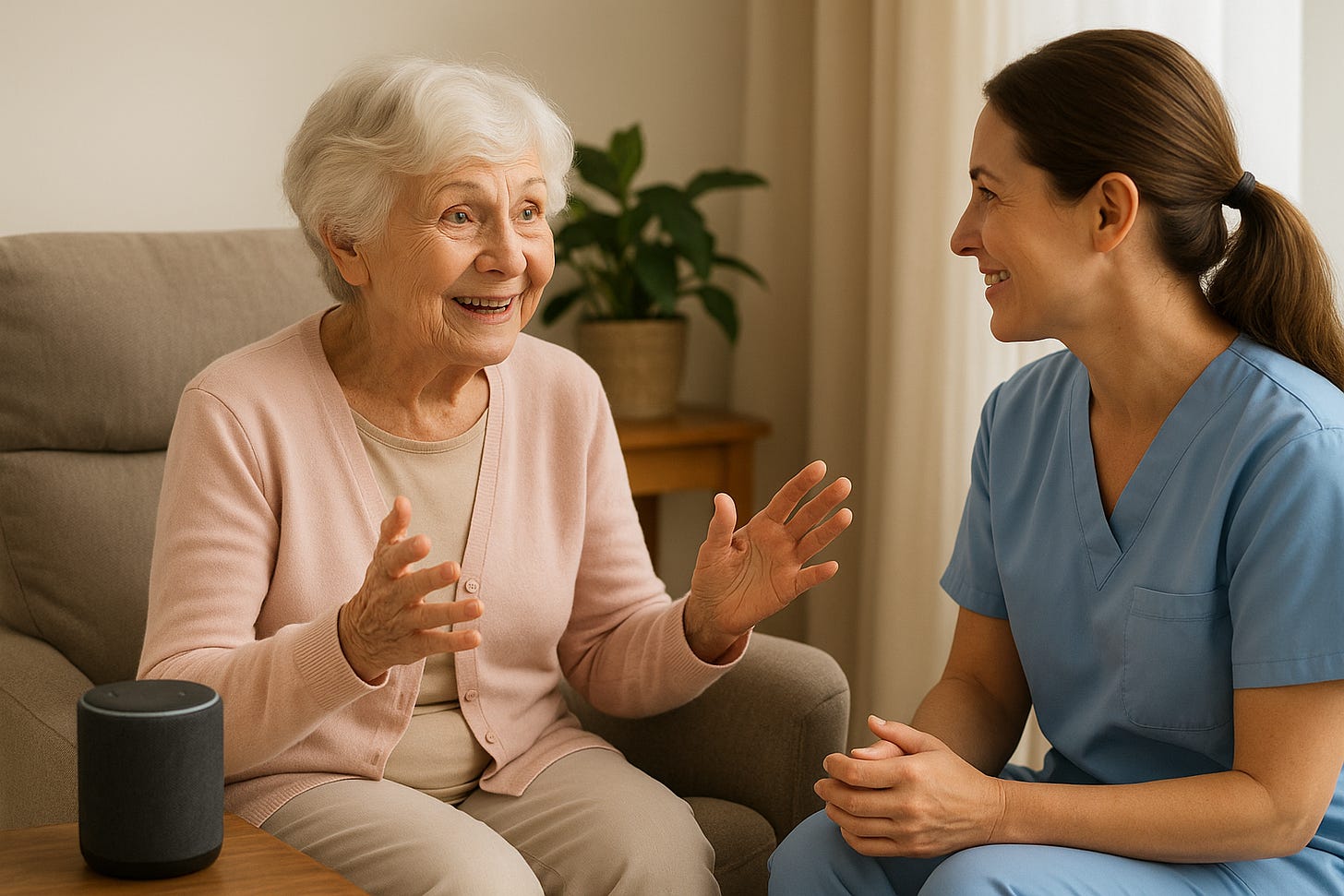Voice Assistants vs. Caregivers: What Alexa or Siri Can Do for Seniors
Have you ever wished you had a little helper nearby — someone who could remind you to take your pills, call your daughter, or turn off the lights without you having to get up? These days, you just might. Her name could be Alexa. Or Siri. Or even “Hey Google.”
Voice assistants are popping up in more and more homes — and for good reason. They’re like having a helpful neighbor in a small speaker, always ready to lend a hand. But can they truly take the place of a human caregiver?
Let’s explore what these digital helpers can do for seniors (and where they fall short).
The Rise of the Talk-Back Devices
Once upon a time, you had to click buttons or flip through a manual. Now, you can just ask.
“Alexa, what’s the weather today?”
“Hey Siri, remind me to take my medicine at 8 p.m.”
“OK Google, call my grandson.”
Voice assistants are built into smart speakers, smartphones, and even watches. They can play music, tell you a joke, or alert you if you forgot to lock the door. For older adults, especially those living alone, they can be a real game changer.
What Alexa and Siri Can Help With
Voice assistants can’t brew your coffee (yet), but they can take a surprising amount off your plate — especially if remembering things or moving around the house has gotten trickier.
1. Daily Reminders That Actually Work
No more sticky notes. You can ask Alexa to remind you to:
Take medications
Drink water
Go for a walk
Attend an appointment
And she’ll do it — right on time, every time.
2. Making Calls Without Lifting a Finger
Voice assistants can call your family, send texts, or even video chat — without you needing to find your phone or press a single button.
Just say, “Call Mary,” and you're connected. This can be a lifeline in emergencies or just a lovely way to hear a familiar voice.
3. Lights, Heat, and Safety — Hands-Free
If you’ve ever struggled to get up and turn off a lamp or adjust the thermostat, you’ll appreciate this: voice assistants can control smart lights, locks, and thermostats with a simple command.
“Alexa, turn on the bedroom light.”
“Hey Siri, set the temperature to 72.”
It's comfort and safety, minus the effort.
4. A Friendly Voice in the Room
Living alone can get quiet — and lonely. Voice assistants can:
Tell jokes
Read audiobooks aloud
Play music
Share news headlines
Play games or trivia
It’s not quite the same as a friend, but it can be a cheerful presence during the day.
Where Voice Assistants Fall Short
Let’s be honest: Alexa might be helpful, but she’s not about to help you out of a chair or notice that something’s off.
Here’s what only a real person — a caregiver — can do:
Help with bathing, dressing, and eating
Notice small health changes
Offer a hug or a laugh at just the right moment
Comfort someone who’s scared or confused
Adapt when the unexpected happens
Voice assistants follow instructions. Caregivers follow instincts. That makes all the difference.
The Best of Both Worlds: A Team Approach
Here’s the sweet spot: use voice assistants for the little things, so caregivers (or family) can focus on the big stuff.
For example:
Let Alexa handle reminders, music, and routines
Let your caregiver handle meals, companionship, and check-ins
Ask your daughter to set it up and show you a few basic commands
You don’t have to be a tech wizard. Just learn one or two things. Start with:
“Alexa, what time is it?” or “Hey Siri, remind me to take my pill at 9 a.m.”
One small win can make a big difference.
A Gentle Word on Privacy
Yes, these devices do listen for their wake word. Some people worry about that. And that’s okay.
If privacy matters to you:
Turn off the microphone when not in use
Read the privacy settings or ask a family member to help you adjust them
Keep the device in public areas, not private spaces like bedrooms or bathrooms
It’s your home — your rules.
Why This Matters
A voice assistant won’t replace a warm smile or a helping hand. But it can give you more freedom, fewer worries, and a little peace of mind — and sometimes, that’s exactly what you need.
So if you’ve ever said, “I wish I had someone to remind me,” maybe you do. She just might live inside a little gray speaker on your kitchen counter.
💡 Caregiver Corner
If you’re the one supporting a loved one, here’s how voice assistants can lighten your load:
Set Up Routines Remotely: Use your app to program reminders or morning check-ins for your parent — even if you’re not there.
Use Drop-In or Video Calls: Some devices let you check in visually without requiring your parent to answer a call.
Encourage Independence: Show your loved one 2–3 simple commands to start. It builds confidence and reduces calls to you for every little thing.
🗨️ Your turn:
Have you had a breakthrough (or a hilarious fail) trying to teach tech to a parent or use it yourself?
Share your experience in the comments — we’d love to learn from each other.



Spy on them?